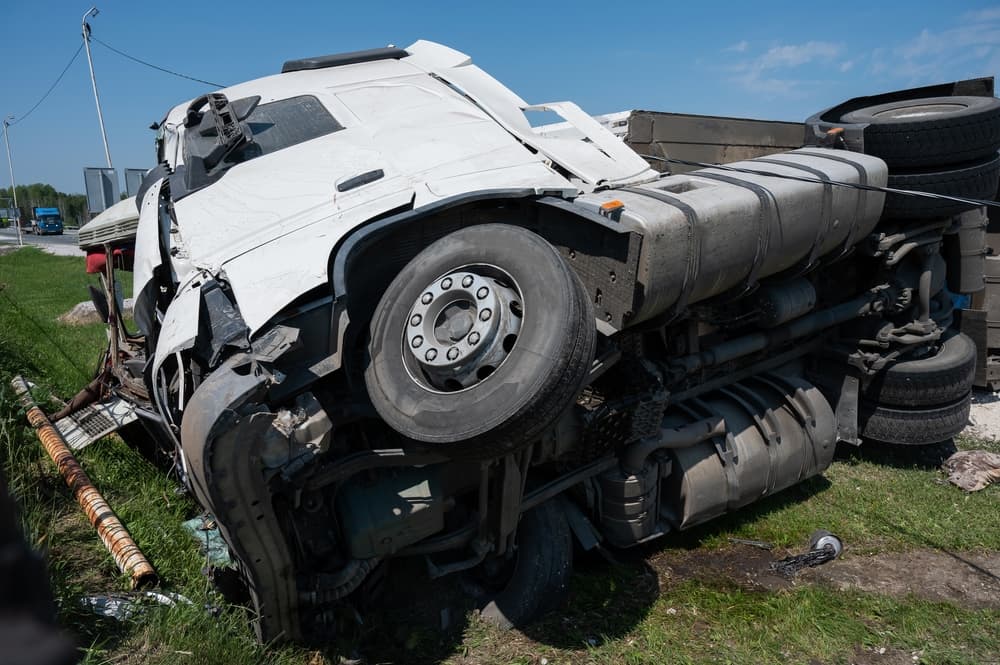A collision between a car and a truck can result in catastrophic damages, including serious injuries and death. After a truck accident, talk to a personal injury lawyer experienced in handling truck accident claims.
The size and weight of trucks often lead to more severe injuries in a crash, and the federal regulations surrounding commercial truck operations make these cases more challenging to navigate than typical car accidents.
Additionally, truck crashes usually involve multiple liable parties. However, after a truck accident, you can help build your claim for compensation. Seek guidance from a proficient Wisconsin truck accident lawyer with a proven track record in navigating complex truck accident cases. Ensure your rights and claims are in capable hands for a fair resolution.
Make Sure Everyone is Safe
Immediately after a truck accident, take action to make sure you and others involved are safe. Move vehicles out of the roadway if possible. This will reduce the risk of other motorists becoming involved in the wreck and causing additional injuries and damage. Clearing the road also provides a path for emergency responders to reach you quickly.
It may not be possible to move the vehicles, especially with large and heavy trucks involved. Put on your hazard lights to warn other drivers approaching the collision site. Trucks usually carry additional caution devices like cones, flags, or flares.
Check yourself for visible injuries and assess your pain levels. If you have passengers in the car, they should do the same. Remember, you should get medical treatment for any injuries you sustain, even if they seem minor.
Call 911 to report the wreck and ask for police and medical assistance if there are injuries.
Contact Law Enforcement
In Wisconsin, the law does not mandate reporting every car accident to the police. However, if the accident results in injury, wrongful death, or significant property damage (over $1,000), you must report it to the local police or sheriff’s department. If no law enforcement is present, report it at the nearest police station or to the Wisconsin Department of Transportation (WisDOT). It is almost certain an accident with an 18-wheeler or other heavy truck will require police assistance.
Law enforcement officers will help maintain the safety of all involved by directing traffic, securing the area, and requesting necessary medical assistance if it has not already been dispatched.
The police will also create an official report documenting the accident’s particulars. This report acts as an impartial record of the incident and includes details about the involved parties, the accident location and time, and any statements from witnesses.
You need the official police report for insurance claims, legal proceedings, and dispute resolution regarding responsibility or liability.
Document the Scene
If possible, you should try to document as much of the accident and scene as possible. Even though the police will compile their official report, having your own records will help when you talk to your insurance company to file the initial claim.
Your documentation should include, where possible:
- Photographs: Use your smartphone to take pictures of the vehicles involved, including damage from the collision. Also look at the roadway for skid marks, damage, hazards, or obstructions that may have contributed to the accident. If you can, take pictures of your visible injuries and those of anyone else involved in the crash.
- Witness statements: Talk to witnesses at the scene who can help describe what happened. You can record their statements on your phone or take notes. Remember to get their contact information. Collect as much information as you can from people while the accident is still fresh in their memories before details begin to fade.
- Truck company data: Contact the trucking company involved in the accident, if possible. Commercial trucks often have dashcams or black box data recorders that can provide crucial information. Your lawyer will handle this for you.
- Your account of the accident: As soon as you can after the truck accident, you should also write down or record your own memories of what happened. Include your thoughts about what happened that may have contributed to the crash. Only share this information with your truck accident lawyer, not the insurance company or any other parties from the accident. It can establish liability.
Exchange Information
Collect insurance details and other information directly from other drivers to start the insurance claims process. If you have a smartphone, use it to capture images of insurance cards and driver’s licenses and share your own information with them. If another driver cannot provide their insurance card, ask if you can photograph their vehicle registration card instead.
Obtain the truck driver’s information, including their driver’s license, insurance, and the trucking company’s details. Trucking companies have specific insurance requirements, and their involvement may affect your claim.
Preserve Evidence
Do not repair or dispose of your vehicle until your insurance company and attorney have assessed it. Trucks often have complex systems and potential equipment malfunctions that can be crucial in determining fault.
Seek Specialized Medical Care
Even if you don’t think your injuries are serious, talk to a medical professional.
Not all injuries immediately appear after an accident. Some injuries, like whiplash or internal injuries, may not show symptoms right away. A medical evaluation can uncover these hidden injuries before they worsen and prevent minor injuries from developing into more severe or chronic conditions. Timely treatment can reduce the risk of complications, relieve pain, and speed up your recovery.
Visiting a doctor also creates an official record of your injuries and their connection to the accident, which is vital for insurance claims and legal proceedings. Insurance companies often require medical records to process claims effectively.
A documented medical history that connects your injuries to the accident strengthens your case. If you delay medical attention, it can cloud the connection between the accident and your injuries, and call into question the severity of your injuries.
Notify Your Insurance Company

Promptly inform your insurance company following a car accident, ideally within the first 24 to 48 hours. Many insurance policies require swift reporting as a prerequisite for coverage. Timely notification ensures compliance with policy terms and grants the insurer adequate time to conduct a thorough investigation.
Insurance companies often require a police report for efficient claim processing, as it offers an official account of the incident and helps establish facts and determine fault.
The police report should include particulars about the accident itself, the involved parties, and any injuries sustained. Share any supporting documentation you have gathered, such as medical records, to expedite the claims process and ensure appropriate compensation for your losses.
Talk to a Truck Accident Attorney
Due to the complexity of truck accident cases, it’s advisable to consult a personal injury attorney with experience in handling truck accident claims. They can navigate the unique challenges associated with commercial truck accidents, such as federal regulations and potential multiple liable parties.
An experienced lawyer will know how to collect specific information in a truck accident investigation, including:
- Hours of service logs: Truck drivers are required to record their hours on duty and behind the wheel. There are limits on how long they can drive at a time and mandated rest periods. The U.S. Department of Transportation (DOT) now mandates that drivers use electronic logging devices, or ELDs, to record their hours to ensure compliance. These logs may show that a truck driver had exceeded their limits when the accident occurred and may indicate the trucker’s drowsy driving caused the crash.
- Pre-trip inspection reports: The Federal Motor Carrier Safety Administration (FMCSA) requires all truck drivers to thoroughly inspect their tractor-trailers and cargo to ensure everything is in the correct working order before departing on a trip. The driver must fix or put the vehicle in service if they find any safety issues during a pre-trip inspection.
- Cargo/freight manifest: A cargo or freight manifest is a list of all the cargo on board the truck, including what it is, its characteristics, and its destination. The manifest may reveal that the truck was carrying cargo that exceeded the weight limits for the truck or that the trucking company or driver failed to properly balance or secure the cargo.
- Inspection and maintenance records: FMCSA requires all trucking companies to retain all inspection, repair, and maintenance records for each vehicle they control through ownership or lease for one year at the location where they house the truck and six months after the truck leaves the carrier’s control through sale, trade-in, or otherwise. These inspection and maintenance reports may show that a tractor-trailer had an issue that was not corrected and may have contributed to the accident.
- Event data recorder logs: While it is not required by law, many trucks have event data recorders, similar to the black box on an airplane. The event data recorder tracks vehicle data such as speed, acceleration, braking, steering, and air-bag deployment. These logs could prove valuable when investigating and determining the cause of a trucking accident.
In addition to these things, your lawyer may look at the truck driver’s employment and driving records for any past history of safety issues, drug or alcohol testing done after the accident, and the driver’s cell phone usage that may reveal distracted driving due to texting or wearing headphones.
Your lawyer may also conduct a post-accident inspection of the truck, asking a mechanic to inspect the damage the tractor-trailer sustained in the accident to determine whether a mechanical defect or inadequate maintenance on the part of the driver or carrier may have contributed to the crash. This inspection may reveal information such as whether headlights or taillights were working or if the tires were worn or bald.
As in other kinds of vehicle accident claims, your lawyer can negotiate with insurance companies on your behalf to ensure you receive fair compensation for medical bills, property damage, lost wages, and pain and suffering. If necessary, they can file a lawsuit and represent you in court.
An experienced truck accident lawyer is a good negotiator who is familiar with the claims process and used to going toe-to-toe with the insurance companies. Your lawyer can handle all communication with insurance companies and other parties involved, relieving you of the stress of dealing with adjusters and protecting your rights.
Lawyers are well-versed in the statutes of limitations for personal injury cases, ensuring you file your claim within the required timeframe.
In Wisconsin, plaintiffs generally must file personal injury claims within three years from the date of the injury. After the statute of limitations expires, you cannot pursue the claim in court.
Having a lawyer on your side can provide peace of mind, knowing that a legal professional is working diligently to protect your interests and secure the best possible outcome for your claim.
Truck Accident Statistics
An 18-wheeler consists of a semi-truck, also called a tractor, with a trailer attached to it. The empty weight of an 18-wheeler is 35,000 pounds, and the loaded weight cannot exceed 80,000 pounds per Federal Highway Administration (FHA) regulations. By contrast, the average passenger vehicle weighs between 2,600 and 4,400 pounds. In the event of a crash, it’s hardly a fair fight.
According to the National Safety Council, in 2021, 5,700 large trucks were involved in a fatal crash, an 18 percent increase from 2020 and a 49 percent increase in the last 10 years.
The NSC defines large trucks as any medium or heavy truck, not including buses and motorhomes, with a gross vehicle weight rating greater than 10,000 pounds.
Both commercial and non-commercial vehicles are included. Large trucks accounted for 9 percent of all vehicles involved in fatal crashes. For the same period, the NSC also reported that 117,300 large trucks were involved in crashes resulting in an injury, a 12 percent increase from 2020.
Since 2016, the number of trucks involved in injury crashes has increased by 15 percent. The Wisconsin Department of Transportation recorded 4,303 crashes in 2021 involving a tractor-trailer, 51 of them fatal and 738 involving injury.
Contact a Truck Accident Lawyer at Pemberton Personal Injury Law Firm Today

If you’ve been involved in a truck accident in Wisconsin, you don’t have to navigate the legal complexities alone. The experienced personal injury attorneys from Pemberton Personal Injury Law Firm are here to assess your case and advocate for your rights.
Our firm has the experience and knowledge to help you get the compensation you deserve. Our legal team of personal injury attorneys has investigated hundreds of truck accidents and we know what to look for to establish liability and bring a claim on your behalf. We make it our priority to get to know our clients and their cases so we can best represent you.
With offices in Baraboo and Madison, we represent clients throughout Wisconsin. Arrange for a consultation with one of our car accident lawyers by calling (608) 448-6242 or filling out our online contact form. There is no cost or obligation when you meet with us. Let us help you get back on the road to recovery.
 Calls Answered 24/7
Calls Answered 24/7









